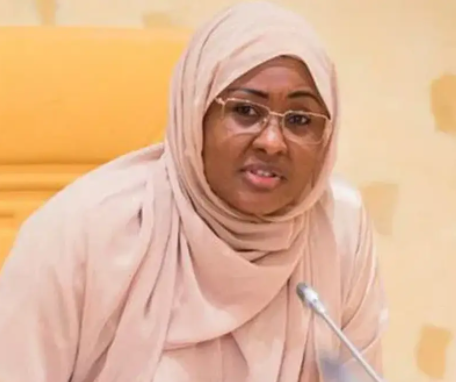The First Lady, Mrs Aisha Buhari has called for a systemic approach and effective policies to strengthen social protection systems, education and decent work opportunities for parents and caregivers to address the conditions that drive child labor.
Mrs Buhari made the call in Abuja at the National Children Conference in commemoration of the 2022 world Day Against Child Labour.
The First Lady who was represented by Kwara First Lady, Mrs Olufolake Abdulrasaq admitted that child labor remains a major threat to child development in Nigeria, in spite of legislative measures taken by the government at various levels to curb the menace. She called for actions at various levels of government, so that Nigerian children will grow up to their full potentials.
She said “Child labour remains a major threat to child development in Nigeria, in spite of legislative measures taken by the government at various levels to curb it. While today’s event stands primarily to celebrate these children, it also provides the avenue to call for increased investment in social protection systems and schemes to establish solid social protection floors and protect children from child labour”.
She said “In its efforts to reduce incidence of child labour, the government is implementing vigorously the National Children School Feeding Programme which is the major plank of the battle to fight Child Labour, increasing children school enrolment and preventing children dropping out of schools.
Worthy of note too is the adoption of the child rights law and other protective laws by governments at the state level as also playing a critical role in militating against child labour”.
“My Future Assured as you know has done very much in this regard especially through advocacy. I call on us all to do more because we are getting more victims and also the circumstances leading to child labour still subsist”.
“All these initiatives of the federal government I believe sets us on the path to eradicating the menace of child labour in our communities and on the path to achieving sustainable development goal”. She added
In his key note address, the Minister of Labour And Employment, Senator Chris Ngige, expressed concern over the high rate of Child labor in the country. He warned against the negative impacts the menace poses in the nation’s future.
He recalled that in 2015, world leaders adopted the SDGs target of 8.7, which was a call to end child labor of all forms by 2025.
“In September 2015, when world leaders gathered to adopt the United Nations Sustainable Development Goals (SDGs), a call in the form of Target 8.7 which seeks to take immediate and effective measures to eradicate Forced Labour, end Modern Slavery and Human Trafficking and secure the prohibition and elimination of the worst forms of Child Labour, including recruitment and use of child soldiers, and by 2025 end Child Labour in all its form” was made by the world leaders. This was amidst growing concerns of a global social crisis with alarming proportion”.
The Minister said “Global estimates have shown that child labour is on the rise; with an increase from 152 million to 160 million between 2016 and 2020. Sub-Saharan Africa has seen 19.6 per cent of all African children in Child Labour, and a possible 9 per cent in hazardous work; this is in contrast to continued progress being made elsewhere in the world.
In Nigeria, Child Labour has become a scourge. Several children find themselves on the streets, forced to make a living, with others employed in industrial complexes, and hazardous environments. Statistics revealed there are about 15 million child workers as at 2020, according to the ILO, with the UN warning that the absence of mitigating strategies could see an increase of children engaged in Child Labour by the end of 2022. This of course, will most certainly have massive implications in the near future.
He said, “we take pride in stating that considerable efforts have been made in dealing with this menace. Most notably the adoption and ratification of ILO Conventions 138 and 182 on Minimum Age and Worst forms of Child Labour respectively; the passage of the Child Rights Act into law to domesticate the Convention on the Rights of the Child, with adoption by about 30 state governments; the implementation and enforcement of National Action Plan on Child Labour, Prohibition and Elimination of Forced Labour, Modern Slavery, and Human Trafficking in workplaces spearheaded by the Federal Ministry of Labour and Employment. Also the National Steering Committee, as well as State Steering Committees, and Desk Officers on Child Labour were established at all levels of government and institutional levels to translate the provisions of the 5-year National Action Plan. In spite of all these, we require more collaboration and partnerships to confront the task ahead of us”.
He added, “this year’s theme tagged ‘Universal Social Protection to End Child Labour’ is essentially a call for more investments in social protection systems in order to create a strong protection base that will keep children away from Child Labour. As we reflect on the progress being made so far, let us also not lose sight of the importance of providing safety nets for children in vulnerable conditions”.

